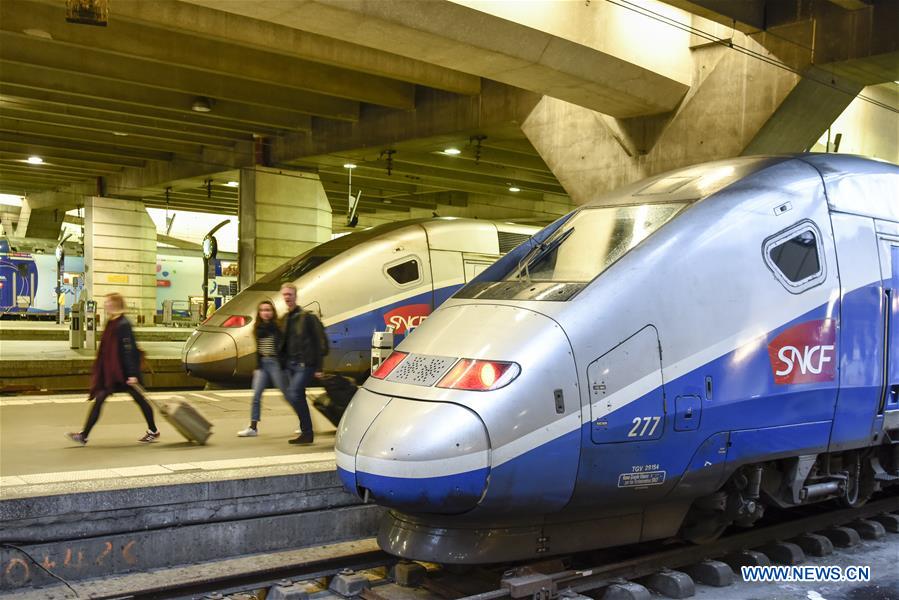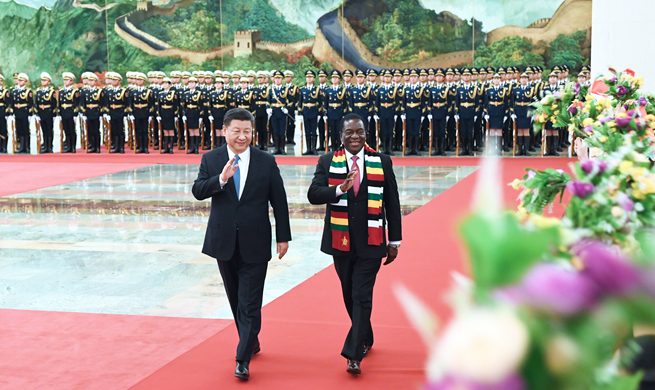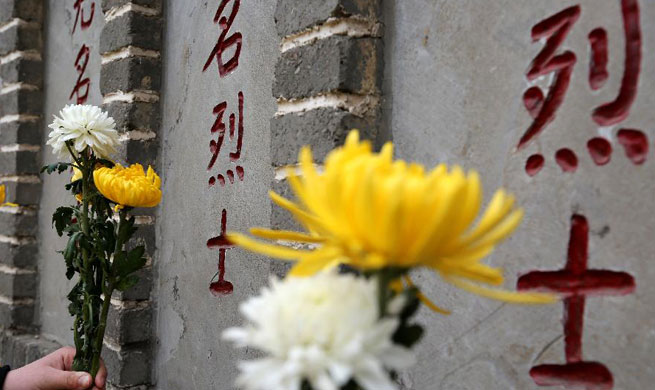
Travellers walk inside Montparnasse Train Station in Paris, France, on April 2, 2018. The three-month railway strike in France started on Monday. (Xinhua/Chen Yichen)
PARIS, April 4 (Xinhua) -- A strike launched by the French national rail service (SNCF) and the resurgence of hotbeds of social frustration have appeared like a reality check in a France troubled by multiple concerns. This railroad battle promises difficulties for President Emmanuel Macron in the coming days.
The launch of the "pearled strike" movement by rail workers on Tuesday signals the beginning of a power struggle for the next phase of young French head of state's five-year term.
GROWING DISCONTENT
Elected as president, in part as a default choice to block extreme-right candidate Marine Le Pen, Macron initially assumed office with the role of a reformer on the international scene, advocating action and good will.
However, French citizens reminded him of reality of 2018 in France: record levels of abstention in the presidential election, with blank and invalid votes at historic highs; populist candidates who, in the first round, won close to half the votes; the results of the extreme right and the radical left. These elements are important in understanding the lack of support for projects proposed by Macron.
The list of people with disgruntlements is growing. Apart from employees of SNCF, those working at Air France (privatized in 1999), Carrefour (the largest private employer in the country), sanitation workers, electricians, pensioners, and students, all plan to mobilize.
It remains currently impossible to know if the movement will come together, but this does not preclude the possibility that a "convergence of conflicts" may start to worry the French executive branch.
The SNCF strike has in fact taken a turn that was unpredicted. The government banked on a repetition of the 1994 strike, which featured a complete block for several days. With this "pearled strike" (two days of strike followed by three days of work, then two more days of strike, until the end of June) the SNCF union seems to have caught the government off-guard.
In addition, if the French often "complain" about the SNCF, they are still attached to this national symbol of public service, the line connecting regions, perceived by many as an indispensable social link.
Even if the government criticizes what it calls the "strike culture," the idea of a social struggle remains rather popular in a country nostalgic for large social movements where the political culture is always the imprint of a form of revolutionary romanticism.
In announcing in February that the reform of the SNCF would be made by executive order, France also gave the impression that the government was deciding to force its way through.
Announcements by the transport minister on Friday, indicating that the project would finally be discussed within the framework of the law, covered their tracks. And many questions regarding the terms of the reform are still without answer.
TOO MUCH REFORM TOO SOON?
Arriving in office with a program that promised to go beyond "the old parties of the right and the left," the "reforms" and "plans" announced by Macron have followed one another at a pace so quick that it has sometimes given vertigo to close observers.
The presidential program, contrary to that of former center-right candidate Francois Fillon, featured a "liberal and at the same time social" dimension, doubted by many French citizens who suffer from a feeling of being left behind and wonder about who will profit from all these reforms.
Different polls have showed that, since his arrival in office, Macron has appeared like the "president of the rich" for more than 75 percent of people queried, while the government, composed largely of experts and technocrats, is perceived by many French people as disconnected from everyday reality.
The railroad battle is only the tip of the iceberg: the fight for public opinion will be critical. Communications will also be decisive, in the weeks to come, as the social struggle.
According to the a recent poll, 53 percent of the French find "unjustified" the reform project for the SNCF, meant to revoke the special status of the rail workers, and open the rail network to private competition starting in 2019.
The stakes for the head of state are considerable. He wishes to succeed where many of his predecessors have come up short. Until now, he has followed a middle way, leaving his prime minister on the front lines.
Less than a year after his election, however, he could be trapped by his own principle of doing things "at the same time".

















